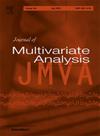Schrödinger基于桥的深度条件生成学习
IF 1.4
3区 数学
Q2 STATISTICS & PROBABILITY
引用次数: 0
摘要
条件生成模型代表了机器学习的重大进步,通过在生成过程中加入附加信息来实现受控数据合成。在这项工作中,我们引入了一种新的基于Schrödinger桥的深度生成方法来学习条件分布。我们的方法从一个由随机微分方程(SDE)控制的单位时间扩散过程开始,该扩散过程将时间t=0的固定点演变为t=1的期望目标条件分布。为了有效实现,我们使用Euler-Maruyama方法对SDE进行离散化,并使用深度神经网络对漂移项进行非参数估计。我们将该方法应用于低维和高维条件生成任务。数值研究表明,虽然我们的方法不能直接提供有条件的密度估计,但生成的样本质量比几种现有方法更高。此外,生成的样本可以有效地用于估计条件密度和相关的统计量,如条件均值和条件标准差。本文章由计算机程序翻译,如有差异,请以英文原文为准。
Schrödinger bridge based deep conditional generative learning
Conditional generative models represent a significant advancement in machine learning, enabling controlled data synthesis by incorporating additional information into the generation process. In this work, we introduce a novel Schrödinger bridge-based deep generative method for learning conditional distributions. Our approach begins with a unit-time diffusion process governed by a stochastic differential equation (SDE) that evolves a fixed point at time into a desired target conditional distribution at . For effective implementation, we discretize the SDE using the Euler–Maruyama method, estimating the drift term nonparametrically with a deep neural network. We apply our method to both low-dimensional and high-dimensional conditional generation tasks. Numerical studies show that, although our method does not directly provide conditional density estimation, the samples generated exhibit higher quality than those from several existing methods. Furthermore, the generated samples can be effectively used to estimate the conditional density and related statistical quantities, such as the conditional mean and conditional standard deviation.
求助全文
通过发布文献求助,成功后即可免费获取论文全文。
去求助
来源期刊

Journal of Multivariate Analysis
数学-统计学与概率论
CiteScore
2.40
自引率
25.00%
发文量
108
审稿时长
74 days
期刊介绍:
Founded in 1971, the Journal of Multivariate Analysis (JMVA) is the central venue for the publication of new, relevant methodology and particularly innovative applications pertaining to the analysis and interpretation of multidimensional data.
The journal welcomes contributions to all aspects of multivariate data analysis and modeling, including cluster analysis, discriminant analysis, factor analysis, and multidimensional continuous or discrete distribution theory. Topics of current interest include, but are not limited to, inferential aspects of
Copula modeling
Functional data analysis
Graphical modeling
High-dimensional data analysis
Image analysis
Multivariate extreme-value theory
Sparse modeling
Spatial statistics.
 求助内容:
求助内容: 应助结果提醒方式:
应助结果提醒方式:


